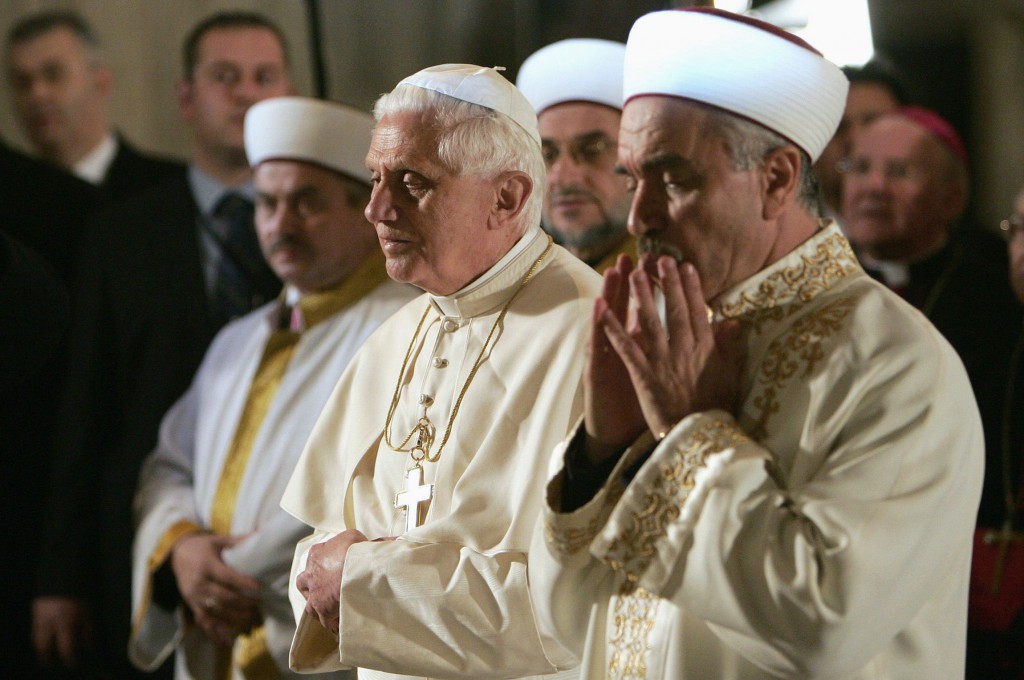
By James Martone
Huseyin Etyemez’s carpet shop sits around the corner from Istanbul’s grandiose Sultan Ahmet Mosque, or the Blue Mosque, as tourists often call it for the turquoise ceramic tiles that adorn the 400-year-old structure’s interior.
The mosque was only one of the places former Pope Benedict XVI visited while in Turkey nearly seven years ago, but it is the stop that many practicing Muslims remember most, said Etyemez, who was living and studying in Los Angeles at the time.
He said the pope’s open interest and concern for Islam were considered positive signs of respect for Muslims in Turkey and beyond, something he said he thought contributed to peaceful coexistence in a world often fraught with ethnic and religious tensions.
“Because of the war in Afghanistan and Iraq, Muslims were thinking there were problems between Muslims and Christians. So it was very positive … a good sign when Benedict visited the mosque,” said Etyemez, now 35 and newly married.
“Different religious leaders can visit sites” revered by other faiths as a way of furthering ties between different religious groups, Etyemez told Catholic News Service from the mosque’s spacious courtyard.
“These activities help and are good things,” he said.
Inside the mosque in late February, the tone was a bit different. Imam Ishak Kizilaslan had just finished a 10-minute sermon in English for a few curious foreign tourists. His remarks focused on Islam’s numerous prophets, including Jesus, whom Muslims believe was a messenger of God, but not God’s son.
After the sermon, Kizilaslan told CNS he welcomed all religions into Sultan Ahmet and claimed that as many as 50 people of other faiths were converting to Islam at the mosque every year. But he said he regarded visits from high-profile church leaders, including Pope Benedict in 2006, as suspicious.
“What is it going to change? It is not clear. For the interfaith dialogue, I have always doubts about what is happening. I don’t think everyone is honest and open,” he said.
He would not elaborate, other than to say “the ones who try to be in the Islamic way are going to have the pleasure of Allah,” the Arabic word for God.
Turkey is a staunchly secular but Muslim country of nearly 74 million people. It is seen by many, including longtime dialogue activist Cemal Usak, as an important link between Christian Europe and the Muslim Middle East.
Usak, who has been working to bring Muslims and Christians together locally and abroad for nearly 30 years, helped found KADIP, the Intercultural Dialogue Platform, which promotes Muslim-Christian activities through writing and journalist workshops, some which have involved as many as 3,000 participants at a time.
Many Muslims believe that Pope Benedict, now retired, was less interested in Islam and the promotion of Catholic-Muslim discourse than his predecessor, said Usak, who under Blessed John Paul II was invited several times to Vatican-sponsored conferences to speak on behalf of Muslims. Under Pope Benedict, Usak said, such Vatican-Muslim gatherings all but stopped, and he was never invited to the Vatican.
Usak said he and other Muslims engaged in activities with Catholics were especially disappointed by Pope Benedict’s 2006 decision to place the Vatican’s central office for interreligious dialogue under control of the president of the Pontifical Council for Culture. This move, Usak said, was widely perceived in the Muslim world as a reduction in the status of interfaith affairs.
“Muslims didn’t find this action positive, because when you put the Pontifical Council for Interreligious Dialogue under the Pontifical Council for Culture, it is a kind of understanding that Islam is not a religion, but a culture. This understanding is harmful for some Muslims, since we accept Islam as a religion, like Christianity and Judaism,” Usak said.
“I hope he will re-establish the interreligious dialogue,” he responded to a question about what Muslims would like to see from the next Catholic pope.
“We have a number of things in common, especially between Christianity and Islam … so why not work on commonalities and to formulate a project against common threats … such as international terror (and) regional conflicts,” he told CNS.
Etyemez, the carpet dealer, agreed that focusing on the similarities was another way to build stronger ties with non-Muslims.
Back at his tiny shop in a building he shares with mostly lawyers, he said interaction between religions, no matter the level, bodes well for the kind of future he wants for the child he and his wife are expecting in September. It’s their first.
“I hope for my baby peace in my country and in all over the world,” he said with a smile. – CNS